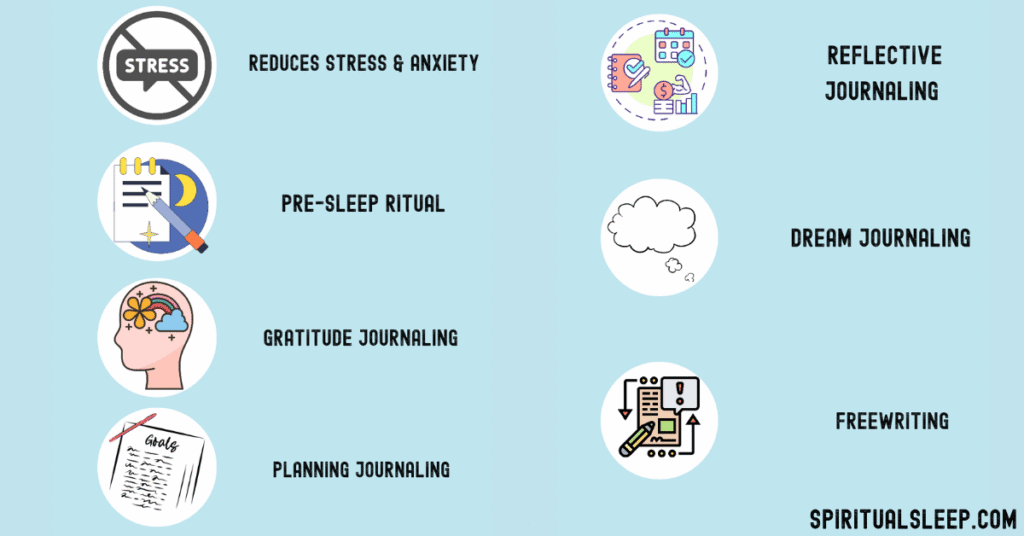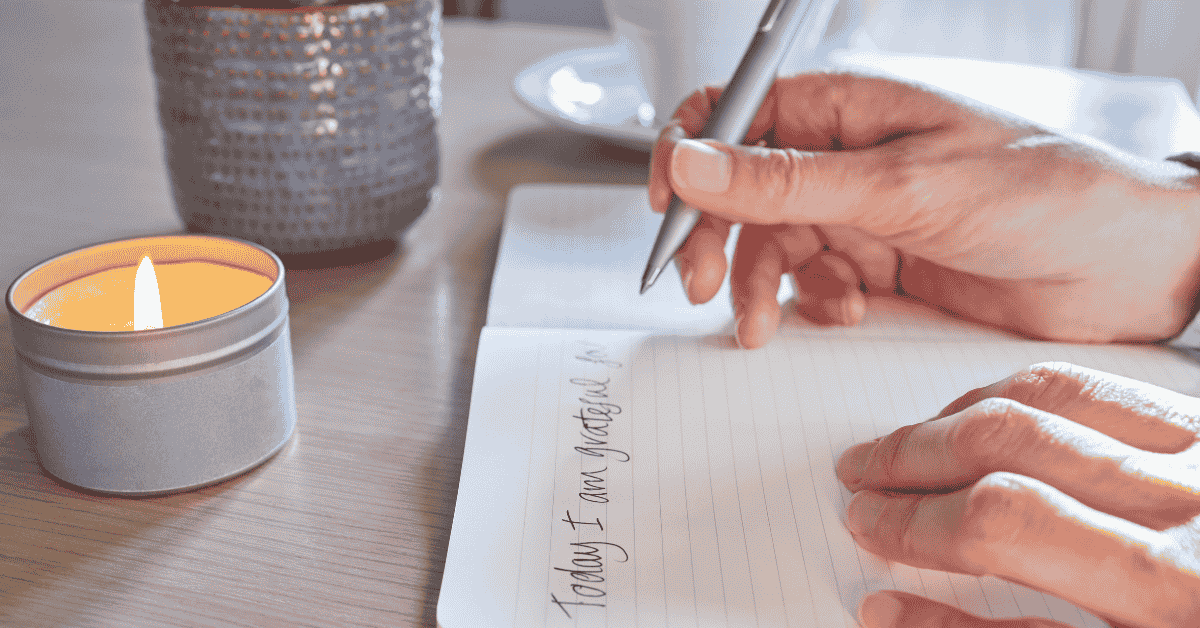How Journaling Can Help You Sleep
Struggling to fall asleep at night? You’re not alone. Many of us toss and turn, our minds racing with unfinished tasks, lingering worries, or plans for the next day. But what if there were a simple, low-cost, and effective tool to calm your mind and set the stage for a restful night? That tool is journaling.
In this comprehensive guide, we’ll explore how journaling can help you sleep better. We’ll delve into the science, provide practical journaling techniques, and even share my personal experience as a medical doctor focused on sleep health.
Table of Contents
Why Can’t You Sleep?
Millions of people struggle with falling asleep or staying asleep. Factors like stress, anxiety, and overthinking are among the top reasons behind sleepless nights. A cluttered mind can make it nearly impossible to relax and drift into sleep.
How Poor Sleep Affects Your Life
When you can’t sleep, the consequences spill over into your daily life. Here are just a few ways poor sleep can impact you:
- Reduced Focus: Sleep deprivation impairs your ability to concentrate and make decisions.
- Mood Swings: A lack of sleep can lead to irritability and even depression.
- Physical Health Risks: Chronic sleep problems increase the risk of hypertension, diabetes, and heart disease.
- Weakened Immunity: Poor sleep leaves you more vulnerable to infections.
As someone who has worked with patients experiencing sleep troubles, I’ve seen the cascading effects of sleep deprivation firsthand. The good news? Journaling can be a game-changer.

How Journaling Can Help You Sleep
Journaling isn’t just about putting words on paper. It’s a powerful tool to declutter your mind, process emotions, and create a sense of calm. Research supports its effectiveness in improving mental health and sleep quality. Let’s explore how it works and the techniques you can use.
1. Journaling Reduces Stress and Anxiety
Stress and anxiety are among the most common culprits of sleepless nights. Journaling serves as an effective outlet for these emotions, helping you process and manage them in a structured way. Here’s how:
- Externalizing Thoughts: When your mind is racing, writing down your worries can help you offload them. Think of it as moving clutter from your brain onto paper, freeing up mental space for relaxation.
- Organizing Your Emotions: Journaling allows you to sort through your feelings and identify the root causes of your stress. This clarity can be the first step toward finding solutions.
- Breaking the Cycle of Rumination: When negative thoughts loop in your mind, journaling provides a productive way to break the cycle. Instead of replaying concerns, you can analyze them objectively and let them go.
Action Steps to Reduce Stress Before Sleep
- Set a Timer: Spend 10 minutes each evening writing about what’s on your mind.
- Start with a Prompt: For instance, “What’s the biggest worry on my mind right now, and what can I do about it?”
- End with Positivity: Write a positive affirmation or a short list of things you’re grateful for.
The Science Behind It
A study in the Journal of Experimental Psychology revealed that expressive writing significantly reduced stress and improved sleep quality for participants dealing with anxiety. By externalizing their concerns, they were able to experience mental relief that facilitated better sleep.
As a medical doctor interested in sleep health, I often advise patients with chronic stress to try journaling. One patient, a high-achieving executive, struggled to switch off at night due to work-related anxiety. I suggested, spend 15 minutes each evening journaling about his biggest concerns and possible solutions.
Within a month, he reported not only sleeping better but also feeling more in control of his stress during the day. This transformation highlights the simple yet profound power of journaling for stress relief.
2. Journaling Helps You Create a Pre-Sleep Ritual
A consistent pre-sleep routine can train your brain to associate certain activities with winding down for the night. Journaling serves as a powerful anchor for this routine, providing a dedicated space to unload the mental clutter of the day and transition into relaxation mode.
How Journaling Fits Into a Pre-Sleep Ritual
- Set a Fixed Time: Choose a specific time each night to journal. This consistency signals your body and mind that it’s time to prepare for sleep.
- Combine with Relaxing Activities: Pair journaling with other calming practices like reading, light stretching, or drinking herbal tea to amplify its effects.
- Create a Comfortable Environment: Use soft lighting and a quiet space to enhance the soothing experience.
Why It Works
Establishing a pre-sleep ritual conditions your mind to recognize journaling as the starting point for relaxation. Writing down your thoughts and feelings acts as a mental “off switch,” allowing you to let go of the day’s stress and focus on rest.
Pro Tip
Keep your journal and a pen on your nightstand to make journaling an effortless part of your bedtime routine.
A consistent pre-sleep routine signals to your brain that it’s time to wind down. Journaling can be a cornerstone of this routine.
3. Gratitude Journaling Promotes Positivity
Gratitude journaling shifts your focus from stress to appreciation, fostering a positive mental state that promotes relaxation and sleep. This practice encourages you to reflect on the good aspects of your life, no matter how small, which can reframe your perspective before bed.
How to Practice Gratitude Journaling
- List Three to Five Things You’re Grateful For: These could be as simple as a warm cup of tea or as profound as a meaningful conversation.
- Be Specific: Instead of writing, “I’m grateful for my family,” delve deeper with something like, “I’m grateful for the laughter I shared with my children at dinner tonight.”
- End on a Positive Note: Finish your journal entry with a hopeful thought or affirmation to carry into your sleep.
Why Gratitude Journaling Helps with Sleep
Focusing on gratitude releases feel-good hormones like dopamine and serotonin, which not only uplift your mood but also prepare your mind for restful sleep. Additionally, by redirecting your thoughts from stress to positivity, you reduce the likelihood of rumination—a common barrier to sleep.
Supporting Research
A study in Personality and Individual Differences demonstrated that individuals who practiced gratitude journaling experienced enhanced sleep quality and duration. The practice effectively reduced bedtime anxiety, a major contributor to insomnia.
I often recommend gratitude journaling to patients who struggle with negative thought cycles at night. One patient, who had difficulty falling asleep due to work-related stress, found that ending each day with gratitude journaling helped her focus on the positives in her life, significantly improving her sleep over time.
Gratitude journaling is a simple yet transformative technique. By focusing on what’s good in your life, you can create a sense of calm and positivity that paves the way for restorative sleep.
Gratitude journaling shifts your focus from stress to appreciation. Reflecting on what you’re grateful for helps release feel-good hormones, like dopamine and serotonin, which support relaxation.
4. Planning Journaling Reduces Nighttime Overthinking
Nighttime overthinking often stems from unresolved plans or tasks for the following day. By engaging in planning journaling, you can gain a sense of control and clarity that helps quiet your mind. This practice allows you to transfer your worries about tomorrow from your mind to the page, creating mental space for relaxation.
Steps to Practice Planning Journaling
- Create a To-Do List: Write down all the tasks and responsibilities you need to tackle the next day.
- Prioritize Your Tasks: Highlight the most important tasks that need immediate attention.
- Outline a Plan: Break down complex tasks into smaller, manageable steps.
- Address Concerns: If you’re worried about specific challenges, jot down potential solutions or strategies to handle them.
Why It Works
- Mental Relief: Planning journaling gives you a sense of preparedness, reducing the mental burden of uncertainty.
- Prevents Rumination: By having a clear plan, your brain feels less compelled to repeatedly analyze the same worries.
- Promotes Relaxation: Knowing that you’ve planned ahead helps signal to your brain that it’s time to rest.
My Recommendation
I often use this technique personally, especially on busy days. I dedicate 10 minutes before bed to outlining the next day’s priorities and identifying any potential challenges. This simple practice not only helps me feel organized but also significantly improves my sleep quality by reducing late-night overthinking.
Overthinking about tomorrow’s tasks can keep you awake. Journaling helps organize your thoughts and clear your mind.
5. Reflective Journaling Provides Closure
Reflective journaling is a valuable tool for wrapping up your day mentally and emotionally, helping you let go of lingering thoughts that might disrupt your sleep. This method involves reviewing the events of your day with the aim of gaining clarity and understanding.
How to Practice Reflective Journaling
- Start by Describing Your Day: Write a brief overview of the main events and interactions that stood out to you. This helps organize your thoughts and highlight moments worth reflecting on.
- Identify Lessons or Insights: Pinpoint what you learned from the day’s experiences, whether they were positive or challenging. For example, “I realized I need to communicate more clearly during meetings.”
- Acknowledge Your Accomplishments: Celebrate even small victories to end your journaling session on a positive note. Recognizing achievements boosts your confidence and prepares your mind for rest.
- Let Go of Negativity: If something went wrong during the day, express your feelings on paper and consider how to move forward. This act of acknowledgment often provides emotional closure.
Why Reflective Journaling Works
Reflective journaling fosters emotional processing, allowing you to resolve unresolved thoughts. By understanding and addressing these emotions, you can quiet your mind and make peace with the day, which is essential for a good night’s sleep.
My Personal Experience
I’ve found reflective journaling particularly effective for individuals who struggle with overthinking. One patient, who constantly replayed stressful events in his mind, started using this technique to analyze and compartmentalize his thoughts. Within weeks, he reported a noticeable improvement in his ability to fall asleep.
Sometimes, unresolved issues from the day can linger in your mind, disrupting sleep. Reflective journaling helps process these experiences.
6. Dream Journaling Enhances Awareness
Dream journaling might not directly improve your sleep quality, but it plays a vital role in enhancing self-awareness and understanding your subconscious mind. Dreams often reflect your innermost thoughts, unresolved emotions, and daily experiences, making them a valuable tool for introspection.
How to Practice Dream Journaling
- Keep Your Journal Handy: Place your journal and a pen on your nightstand to capture dreams as soon as you wake up.
- Write Immediately Upon Waking: Dreams fade quickly, so jot down details—events, emotions, people, and symbols—right after waking up.
- Note Recurring Patterns: Pay attention to recurring themes or symbols. These can provide insight into unresolved stressors or emotional triggers.
Why Dream Journaling Helps
- Enhances Emotional Processing: Recording dreams helps you understand subconscious worries or fears, enabling you to address them.
- Supports Self-Reflection: Analyzing dreams offers deeper insights into your thought patterns and emotional state.
- Improves Recall: Regularly journaling about dreams trains your brain to remember them better, fostering a connection to your inner self.
A Personal Recommendation
I’ve encouraged patients with recurring nightmares or vivid dreams to maintain a dream journal. One patient discovered that recurring themes in her dreams stemmed from unresolved work stress. By identifying and addressing this issue, her overall sleep quality improved. Personally, I’ve found dream journaling to be a fascinating way to uncover hidden aspects of my own thoughts and emotions.
Dream journaling provides more than just a record of your subconscious—it’s a pathway to deeper self-awareness and emotional balance, both of which contribute to improved sleep in the long run.
Dream journaling isn’t directly about improving sleep quality but can help you better understand your sleep patterns and subconscious mind.
7. Freewriting Clears Mental Clutter
Freewriting is a liberating journaling technique where you write continuously without worrying about structure, grammar, or even coherence. It allows your thoughts to flow naturally, serving as a mental release valve for accumulated clutter.
How to Practice Freewriting
- Set a Timer: Dedicate 5-10 minutes to this exercise. The time limit helps keep you focused and ensures the activity remains manageable.
- Write Without Judgment: Let your thoughts spill onto the page without censoring or editing them. This isn’t the time for perfection.
- Embrace the Messiness: Even if what you write seems random or incoherent, it’s part of the process.
Why Freewriting Works
- Releases Mental Noise: By transferring jumbled thoughts to paper, you create mental space for relaxation.
- Fosters Self-Discovery: Sometimes, unexpected insights emerge when you allow your mind to wander freely.
- Promotes Emotional Catharsis: Writing without restrictions can help you release pent-up feelings, making it easier to wind down.
I often suggest freewriting to clients who feel overwhelmed by mental clutter. One client, a student preparing for exams, used this technique to empty her racing thoughts each night. She reported not only better sleep but also increased focus the following day. This method can be particularly helpful when your mind feels overloaded before bed.
By engaging in freewriting, you create a mental blank slate, paving the way for a calmer, more restorative sleep.
Freewriting is an unstructured form of journaling where you write whatever comes to mind without worrying about grammar or coherence.
8. Affirmation Journaling Builds Confidence
Affirmation journaling is a transformative practice that involves writing positive statements about yourself, your life, and your future. It encourages self-love, reduces negative thought patterns, and fosters a more positive mindset. This practice is especially helpful before bed, as it can calm your mind and reduce bedtime anxiety, allowing you to rest peacefully and wake up with confidence.
How to Try It
To get started with affirmation journaling, spend a few minutes each night before bed reflecting on positive statements about yourself and your life. These affirmations are designed to challenge any negative thoughts and encourage feelings of peace, self-worth, and empowerment. Try writing 5-10 affirmations each night, such as:
“I am capable of handling tomorrow’s challenges.”
“I deserve rest and relaxation.”
“I trust in my ability to navigate whatever comes my way.”
“I am worthy of love, success, and happiness.”
“I am proud of the progress I’ve made today.”
“I am at peace with myself and my life.”
Why It Works
Affirmations work because they help reframe your mindset and replace negative or anxious thoughts with empowering, positive ones. When practiced regularly, affirmation journaling can shift your thought patterns and build a sense of confidence and self-belief.
By focusing on positive affirmations before bed, you send calming signals to your brain, reducing anxiety and promoting a sense of peace and optimism. This is particularly useful at night, when your mind tends to replay the events of the day or worries about the future.
By incorporating affirmation journaling into your nighttime routine, you not only promote self-love and confidence but also enhance your sleep quality. Affirmations help to quiet the mind and foster a peaceful, relaxed state, setting the tone for restorative rest. As you consistently affirm your worth and abilities, you’ll notice a stronger sense of self-esteem and an ability to approach life with greater confidence and resilience.
Tips for Successful Journaling
- Be Consistent: Aim to journal at the same time each night.
- Create a Relaxing Environment: Use dim lighting and a comfortable writing space.
- Experiment with Techniques: Try different types of journaling to see what works best for you.
- Use Prompts: If you’re unsure what to write, use prompts like “What made me smile today?” or “What’s one thing I can let go of before bed?”
- Don’t Overthink: There’s no “right” way to journal. Focus on expressing yourself authentically.
Medical Disclaimer:This article is based on thorough research, scientific studies, and my personal experience as a medical doctor interested in sleep health. This content is for informational purposes only and should not be considered medical advice. Each individual’s sleep needs and health conditions are unique. I recommend consulting with a healthcare professional or sleep specialist to address specific concerns for better sleep.
Final Thoughts
Journaling is more than just a nightly ritual, it’s a proven method to calm your mind, process emotions, and set the stage for restorative sleep. From gratitude journaling to reflective writing, there’s a technique for everyone. As a medical doctor invested in sleep health, I’ve seen how incorporating journaling into a bedtime routine can transform restless nights into peaceful slumber.
Start small, stay consistent, and enjoy the journey to better sleep—one journal entry at a time.
References
- Journal of Experimental Psychology – Expressive Writing and Anxiety Reduction
- Personality and Individual Differences – Gratitude and Sleep Quality
- Sleep Health – Journaling’s Impact on Sleep
- Frontiers in Psychology – Reflective Writing and Emotional Processing
- Journal of Clinical Psychology – To-Do Lists and Sleep Onset








https://t.me/Martin_officials